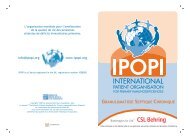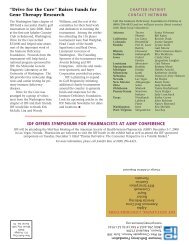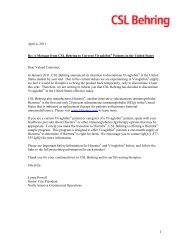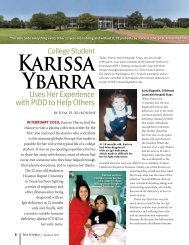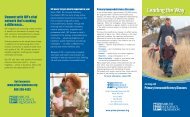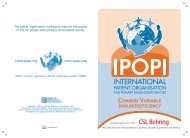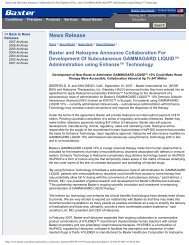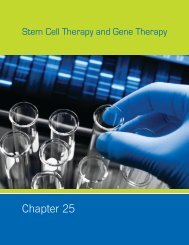IDF Patient & Family Handbook for Primary Immunodeficiency ... - IDFA
IDF Patient & Family Handbook for Primary Immunodeficiency ... - IDFA
IDF Patient & Family Handbook for Primary Immunodeficiency ... - IDFA
You also want an ePaper? Increase the reach of your titles
YUMPU automatically turns print PDFs into web optimized ePapers that Google loves.
General Care<br />
85<br />
General Health Measures<br />
Nutrition<br />
An adequate diet provides nutrients essential <strong>for</strong><br />
normal growth and development, body repair<br />
and maintenance. While good dietary habits<br />
are important <strong>for</strong> everyone, they are extremely<br />
important <strong>for</strong> the primary immunodeficient<br />
individual. Children, in particular, need a balanced<br />
diet to grow and develop normally. Dietary<br />
guidelines <strong>for</strong> Americans encourage eating a<br />
variety of foods, maintaining an ideal body weight,<br />
consuming adequate starch and fiber and limiting<br />
the intake of fat, cholesterol, sugar, salt and alcohol.<br />
There are a number of “fad” diets and other diet<br />
recommendations that claim to boost immune<br />
resistance or help fight disease. It is very important<br />
to consider any unusual diet very carefully and to<br />
partner with your physician in this decision. The only<br />
truly proven dietary measure <strong>for</strong> increasing immunity<br />
is to have a balanced diet with adequate nutrition.<br />
CHAPTER 17; FIGURE 1<br />
Digestive System<br />
Special Medical Diets<br />
In times of infection, illness, or food intolerance, the<br />
normal diet may need to be modified. Talk to your<br />
doctor to learn when these diets are indicated.<br />
Clear Liquid Diet<br />
A clear liquid diet may be used when there is<br />
a severe intolerance to food during infection or<br />
illness, or when nausea, vomiting and diarrhea<br />
are present. Since it is nutritiously inadequate,<br />
a clear liquid diet is usually only used <strong>for</strong> one<br />
to two days. The main purpose of a clear liquid<br />
diet is to replace lost fluids. Suggested fluids<br />
include: electrolyte replacement solutions such as<br />
Pedialyte and Gatorade , fat-free broth, strained<br />
vegetable broth, strained citrus juices, plain<br />
Jell-O , and fruit ices.<br />
Full Liquid Diet<br />
A full liquid diet may be ordered when there is<br />
difficulty in chewing or swallowing solid foods,<br />
as in pharyngitis, or when advancing from clear<br />
liquids. When properly planned, this diet can be<br />
nutritious and used <strong>for</strong> extended periods of time.<br />
A full liquid diet includes all foods that are liquid at<br />
room and body temperatures. Eggs (soft-cooked),<br />
strained meats, fruits and vegetables, ice cream,<br />
milkshakes and creamed soups are examples of<br />
food which can be added to the diet.<br />
Soft Diet<br />
A soft or bland diet is the transitional step between<br />
a liquid and a regular diet. Suggested foods<br />
include those that are easily chewed, swallowed<br />
and digested. Foods to be avoided include those<br />
that have high fiber content, are rich and highly<br />
flavored or are fried and greasy.<br />
In some circumstances, if patients are not able<br />
to eat or drink normally, or if they can eat but are<br />
unable to absorb nutrients adequately from their<br />
stomach and intestines, there are procedures to<br />
assist them in maintaining adequate nutrition.








